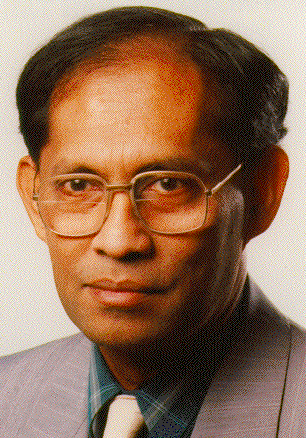Professor Nalin Chandra Wickramasinghe
The Popular Science article Mysterious red cells might be aliens said
“As bizarre as it may seem, the sample jars brimming with cloudy, reddish rainwater in Godfrey Louis’s laboratory in southern India may hold, well, aliens.In April, Louis, a solid-state physicist at Mahatma Gandhi University, published a paper in the prestigious peer-reviewed journal Astrophysics and Space Science in which he hypothesizes that the samples — water taken from the mysterious blood-colored showers that fell sporadically across Louis’s home state of Kerala in the summer of 2001 — contain microbes from outer space.
Specifically, Louis has isolated strange, thick-walled, red-tinted cell-like structures about 10 microns in size. Stranger still, dozens of his experiments suggest that the particles may lack DNA yet still reproduce plentifully, even in water superheated to nearly 600 degrees Fahrenheit. (The known upper limit for life in water is about 250 degrees Fahrenheit.)…
Louis’s theory holds special appeal for Professor Chandra Wickramasinghe. A quarter of a century ago, he co-authored the modern theory of panspermia, which posits that bacteria-riddled space rocks seeded life on Earth.
‘If it’s true that life was introduced by comets four billion years ago’, the astronomer says, ‘one would expect that microorganisms are still injected into our environment from time to time. This could be one of those events.’”
Professor Nalin Chandra Wickramasinghe, BSc (Ceylon), MA, PhD, ScD (Cantab), Hon DSc (Sri Lanka, Ruhuna), Hon DLitt (Tokyo, Soka), FIMA, FRAS, FRSA is Professor of Applied Mathematics and Astronomy at Cardiff University of Wales and Director of the Cardiff Centre for Astrobiology.
Chandra was born in Sri Lanka and was educated at Royal College, Colombo and later at the University of Ceylon. In 1960 he obtained a First Class Honors degree in Mathematics and won a Commonwealth scholarship to proceed to Trinity College Cambridge. He commenced work in Cambridge on his PhD degree under the supervision of the late Sir Fred Hoyle, and published his first scientific paper in 1961. He earned a PhD degree in Mathematics in 1963 and was elected a Fellow of Jesus College Cambridge in the same year. In the following year he was appointed a Staff Member of the Institute of Astronomy at the University of Cambridge. Here he began his pioneering work on the nature of Interstellar Dust, publishing many papers in this field that led to important paradigm shifts in astronomy. He published the very first definitive book on Interstellar Grains in 1967. In 1973 he was awarded Cambridge University’s highest doctorate for Science, the prestigious ScD. He was awarded an honorary doctorate by the Soka University of Tokyo, Japan in 1996 and the degree of Doctor of Science (Honoris Causa) by the University of Ruhuna, Sri Lanka in 2004.
Chandra has made important contributions to the theory of cosmic dust. In 1974 he first proposed the theory that dust in interstellar space and in comets was largely organic, a theory that has now been vindicated. Jointly with the late Sir Fred Hoyle he was awarded the International Dag Hammarskjold Gold Medal for Science in 1986, and in 1992 he was decorated by the President of Sri Lanka with the titular honour of Vidya Jyothi. He was awarded the International Sahabdeen Prize for Science in 1996. He is an award-winning poet and the author or coauthor of over 20 books and over 250 scientific papers. He has held visiting professorial appointments in a large number of Universities worldwide and has at one time been advisor to the President of Sri Lanka. He is a Fellow of the Royal Society of Arts, Royal Astronomical Society, and Institute of Mathematics and Its Applications.
He authored Cosmic Dragons : Life and Death on Our Planet, coauthored Space and Eternal Life: A Dialogue Between Chandra Wickramasinghe and Daisaku Ikeda, Astronomical Origins of Life – Steps Towards Panspermia, Archaeopteryx, the Primordial Bird: A Case of Fossil Forgery, Cosmic Life-Force, Our Place in the Cosmos: The Unfinished Revolution, Life on Mars?: The Case for a Cosmic Heritage?, The Theory of Cosmic Grains, and was coeditor of Fred Hoyle’s Universe and Solid State Astrophysics.
